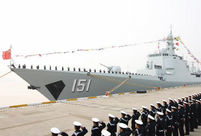 Famous Lanzhou beef noodles
Famous Lanzhou beef noodles Armed Police hold anti-terrorism drill in SE China's Xiamen
Armed Police hold anti-terrorism drill in SE China's Xiamen Harbin Int'l Ice and Snow Festival opens
Harbin Int'l Ice and Snow Festival opens 'Jin' named the word of the year by cross-strait netizens
'Jin' named the word of the year by cross-strait netizens Chinese scientific expedition goes to build new Antarctica station
Chinese scientific expedition goes to build new Antarctica station
 Chinese naval escort fleet conducts replenishment in Indian Ocean
Chinese naval escort fleet conducts replenishment in Indian Ocean 17th joint patrol of Mekong River to start
17th joint patrol of Mekong River to start China's moon rover, lander photograph each other
China's moon rover, lander photograph each otherBEIJING - When China's globalization-fueled growth spurt began to dwindle, the Communist Party of China (CPC) renewed the reform and opening up policies that launched the former economic backwater into position as the world's number two powerhouse.
As the year draws to an end, a consensus is emerging that the decision the CPC made in its 18th Central Committee Third Plenary Session in 2013 will be on par with the reforms made thirty-five years ago, which ushered in over three decades of expanding prosperity.
Inward and outward
The Third Plenary Session of the 11th CPC Central Committee in 1978 ended modern China's era of seclusion from the outside world.
The significance of the landmark third plenum was only apparent in hindsight, said Davide Cucino, President of the European Union Chamber of Commerce in China (EUCCC).
By directing the country to stress economic development, the plenum initiated a wave of liberalizing the planned economy and opening gates to foreign investors, steering the impoverished country to galloping economic growth.
Bilateral trade between China and the United States totaled 990 million U.S. dollars in 1978. Last year, the figure ballooned to 485 billion U.S. dollars, making the two countries each other's second-largest trading partner.
However, foreign investors in recent years have increasingly complained about a less desirable business environment, and trade protectionists who want to restrict foreign business began to raise their voices. Others in China argue the complacent view that an ever-stronger China needs no one else.
The 2013 third plenum that ended in November reiterated China's commitment to building a more open economy. The government vowed in a decision that opening up has been a crucial choice China has made for its destiny in modern times, and there can never be an end.
Lowering the investment threshold, stepping up the development of free trade zones and increasing the opening up of inland and border areas will be high on the agenda, according to the decision.
In a statement, the EUCCC said it was impressed by the decision, which went beyond its expectations.
More work will be done to expand the opening up of inland and border areas, and border areas will be encouraged to conduct more trade and other economic cooperation with neighboring countries, Minister of Commerce Gao Hucheng told Xinhua in an exclusive interview.
China will also simplify market access for foreign investors, and make its investment policy steady, transparent and predictable, said Gao.
Outbound investments will also benefit, "which has just recently become a source of newfound positivity about China from Australia to Europe and the United States," according to Daniel H. Rosen and Thilo Hanemann of the advisory firm Rhodium Group.
"The reforms announced at the Third Plenum are likely to bolster China's outbound foreign direct investment stock, which we project to grow from the current 500 billion to 1-2 trillion U.S. dollars by 2020," they added.

 Chinese Consulate General in S.F. burned for arson attack
Chinese Consulate General in S.F. burned for arson attack Roar of J-15 fighter is melody for operator on the Liaoning
Roar of J-15 fighter is melody for operator on the Liaoning A 90-year-old forester's four decades
A 90-year-old forester's four decades Most touching moments in 2013
Most touching moments in 2013 2013: Joys and sorrows of world politicians
2013: Joys and sorrows of world politicians Missile destroyer Zhengzhou commissioned to Chinese navy
Missile destroyer Zhengzhou commissioned to Chinese navy China is technically ready to explore Mars
China is technically ready to explore Mars Photo story: Life changed by mobile technology
Photo story: Life changed by mobile technology Bullet train attendants' Christmas Eve
Bullet train attendants' Christmas Eve Heart-warming Laba porridge
Heart-warming Laba porridge Gallery: China's trapped icebreaker makes successful escape
Gallery: China's trapped icebreaker makes successful escape Photo story: We are special soldiers
Photo story: We are special soldiers 'Rong' selected HK's character of the year for 2014
'Rong' selected HK's character of the year for 2014 Famous Lanzhou beef noodles
Famous Lanzhou beef noodles Chinese Consulate Arson Suspect Makes 1st Court Appearance
Chinese Consulate Arson Suspect Makes 1st Court AppearanceDay|Week|Month